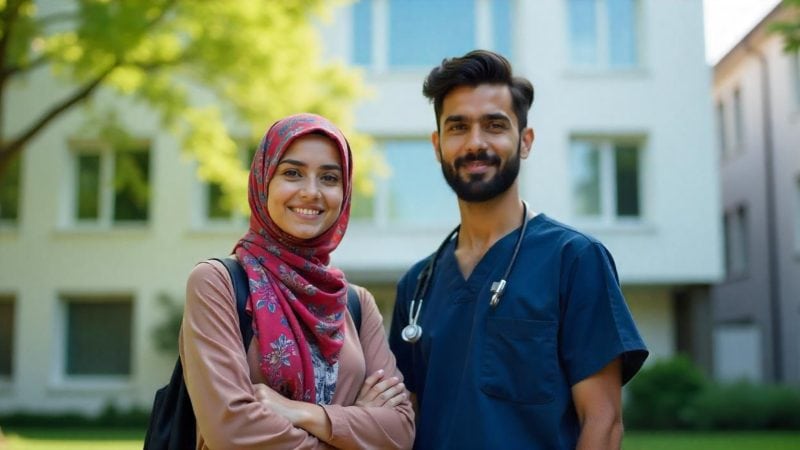Choosing the right medical college is crucial, especially for a profession as demanding and impactful as medicine. Pakistan has some really good medical colleges known for their quality education, experienced faculty, and modern facilities.
This guide covers the top 10 medical colleges in Pakistan with a breakdown of what makes each college special. Here’s a closer look at the best medical colleges you can send your children to, to become the best doctors!
Table of Contents
Best Medical Colleges in Pakistan
| No. | College Name | Location | Unique Feature |
| 1 | Aga Khan University (AKU) | Karachi | Internationally recognized, research-intensive |
| 2 | King Edward Medical University (KEMU) | Lahore | Oldest medical college, renowned for research |
| 3 | Allama Iqbal Medical College (AIMC) | Lahore | Focus on practical skills, affiliated with Jinnah Hospital |
| 4 | Dow University of Health Sciences (DUHS) | Karachi | Known for advanced facilities and research centers |
| 5 | Fatima Jinnah Medical University (FJMU) | Lahore | Leading institution for women’s medical training and education |
| 6 | Khyber Medical University (KMU) | Peshawar | Strong focus on regional healthcare and research |
| 7 | Punjab Medical College (PMC) | Faisalabad | Emphasis on community medicine |
| 8 | Liaquat University of Medical and Health Sciences (LUMHS) | Jamshoro | Rural health training and community programs |
| 9 | Bolan Medical College (BMC) | Quetta | Sole public medical college in Balochistan |
| 10 | Rawalpindi Medical University (RMU) | Rawalpindi | Broad clinical exposure with three hospital affiliations |
1. Aga Khan University (AKU) – Karachi
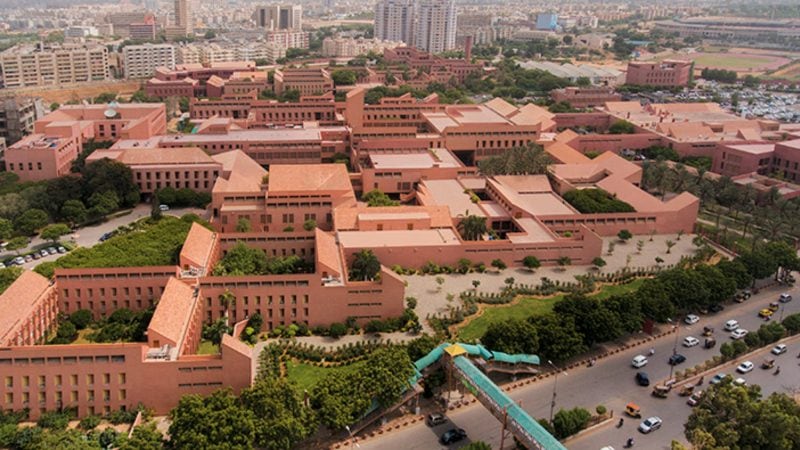
Aga Khan University (AKU) is widely recognized as one of the finest medical colleges in Pakistan, and it’s often a dream school for aspiring doctors. Established in 1983, AKU follows an international standard for education, offering advanced teaching methods and a wide variety of healthcare programs. The university is part of the Aga Khan Development Network, which means students get access to a global network of resources, research, and opportunities.
AKU is known for its high-quality research facilities and an extensive clinical setup with Aga Khan Hospital, one of the most modern hospitals in Pakistan. The university also has strong ties with international institutions, providing students with exchange programs and global exposure. Admission here is highly competitive, and the students are selected based on rigorous standards. Many AKU graduates go on to work and study abroad, thanks to the university’s international reputation.
| Feature | Details |
| Location | Karachi |
| Established | 1983 |
| Programs Offered | MBBS, Nursing, Health Sciences, Postgraduate Studies |
| Affiliation | Aga Khan Hospital (for clinical training) |
| Unique Feature | Strong international recognition and research focus |
With its modern facilities, skilled faculty, and strong research focus, AKU offers a comprehensive environment for students to develop their skills.
2. King Edward Medical University (KEMU) – Lahore
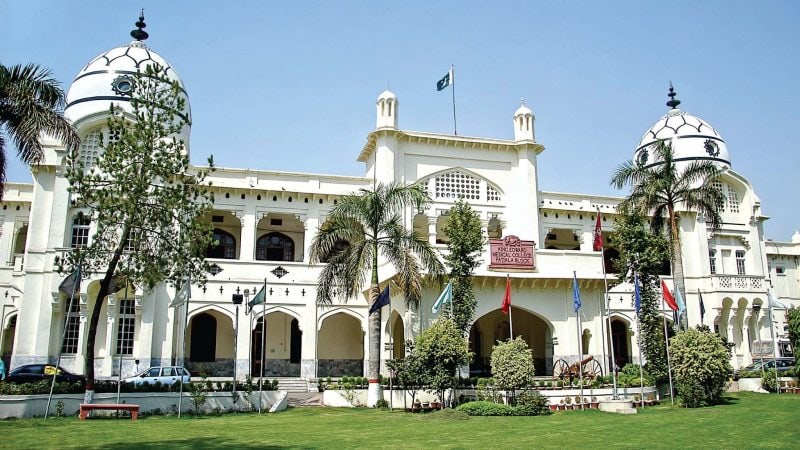
KEMU is not only one of the best medical schools in Pakistan but also the oldest. Established in 1860, KEMU has a legacy of over 160 years and is respected for its historical importance and the quality of education it provides. The university was named after King Edward VII and has educated thousands of doctors who serve across Pakistan and internationally.
KEMU is directly affiliated with Mayo Hospital, one of the largest public hospitals in Pakistan, which provides students with a vast clinical setting to practice and learn. The university offers a variety of programs from basic MBBS to advanced specialties in medicine, surgery, and research fields. Many of Pakistan’s leading doctors and medical experts are KEMU alumni, and the college has a strong network of graduates all around the world.
| Feature | Details |
| Location | Lahore |
| Established | 1860 |
| Programs Offered | MBBS, MPhil, PhD, Postgraduate Programs |
| Affiliation | Mayo Hospital (one of the biggest hospitals) |
| Unique Feature | Known for rich history, tradition, and alumni network |
Students at KEMU benefit from the combination of a rigorous academic program and practical experience at a busy hospital, making it one of the top choices for medical students in Pakistan.
3. Allama Iqbal Medical College (AIMC) – Lahore
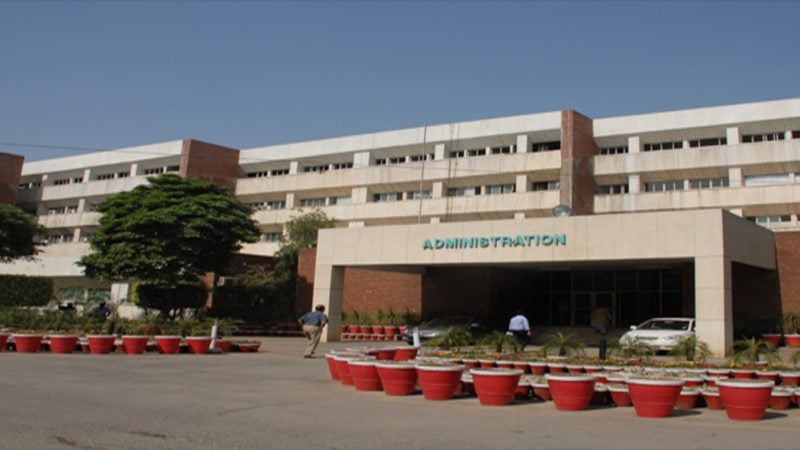
Allama Iqbal Medical College (AIMC) is another top medical institution in Lahore. Established in 1975, AIMC is known for its excellent teaching staff, advanced labs, and state-of-the-art facilities. The college is associated with Jinnah Hospital, one of the largest and most respected hospitals in Lahore, where students receive extensive practical training.
AIMC offers a variety of programs, including MBBS, BDS, and Allied Health Sciences, which gives students the flexibility to choose different career paths in healthcare. The affiliation with Jinnah Hospital is a significant advantage, as it provides students with real-world experience in patient care and clinical procedures. The college’s location in Lahore also allows students to experience a vibrant city life along with a strong educational journey.
| Feature | Details |
| Location | Lahore |
| Established | 1975 |
| Programs Offered | MBBS, BDS, Allied Health Sciences |
| Affiliation | Jinnah Hospital |
| Unique Feature | Strong clinical exposure through Jinnah Hospital |
AIMC’s hands-on approach to teaching and learning helps students develop practical skills that prepare them for medical careers right after graduation.
4. Fatima Jinnah Medical University (FJMU) – Lahore
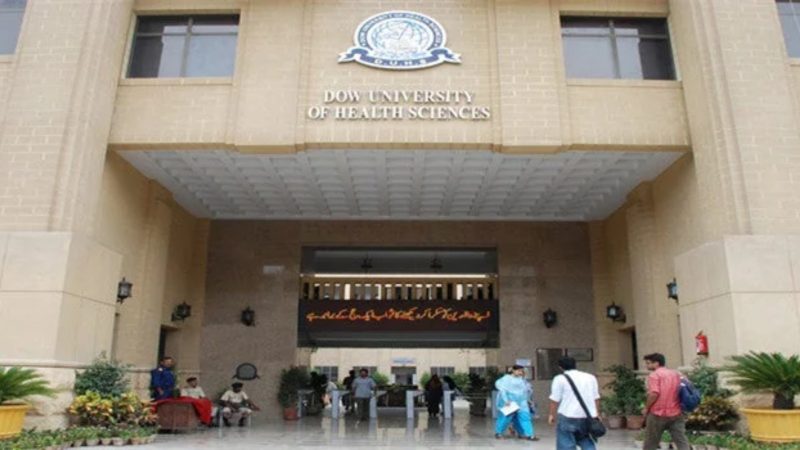
FJMU was established in 1948. It is one of the top medical collages and universities for women in Pakistan. Named after Fatima Jinnah, the sister of Pakistan’s founder, it’s respected for promoting women’s education in healthcare. This university exclusively admits female students, providing them with a safe and supportive environment to study medicine.
FJMU is associated with Sir Ganga Ram Hospital, one of the busiest public hospitals in Lahore, which offers students practical training and hands-on experience. The university’s faculty includes experienced doctors and specialists who guide students in various fields of medicine. Many graduates from FJMU have gone on to become leaders in their fields, making significant contributions to healthcare both locally and globally.
| Feature | Details |
| Location | Lahore |
| Established | 1948 |
| Programs Offered | MBBS, Nursing, Postgraduate Studies |
| Affiliation | Sir Ganga Ram Hospital |
| Unique Feature | Exclusively for women, with strong clinical training |
FJMU is an ideal choice for women who want a quality education in medicine and wish to work in healthcare with strong practical skills.
5. Dow University of Health Sciences (DUHS) – Karachi
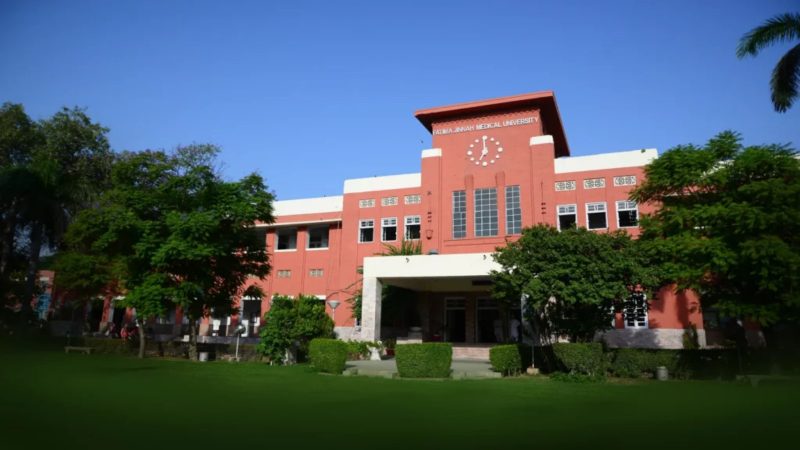
Dow University of Health Sciences (DUHS) in Karachi is one of Pakistan’s oldest and most respected medical colleges and universities. Established in 1945, DUHS offers a broad range of medical programs, including MBBS, BDS, and Pharmacy. DUHS is known for its strong research culture and has several affiliated hospitals where students gain hands-on experience.
One of the highlights of DUHS is its research and diagnostic labs, which are among the most advanced in the country. Students have opportunities to work on projects that address real-world health issues, which builds their research skills and prepares them for a variety of career paths. DUHS is affiliated with Civil Hospital Karachi, a large hospital where students can gain practical experience in patient care and clinical procedures.
| Feature | Details |
| Location | Karachi |
| Established | 1945 |
| Programs Offered | MBBS, BDS, Pharmacy, Allied Health |
| Affiliation | Civil Hospital Karachi |
| Unique Feature | Focus on research and clinical practice |
With its combination of research opportunities and clinical exposure, DUHS is a top choice for students interested in both patient care and medical research.
6. Khyber Medical University (KMU) – Peshawar
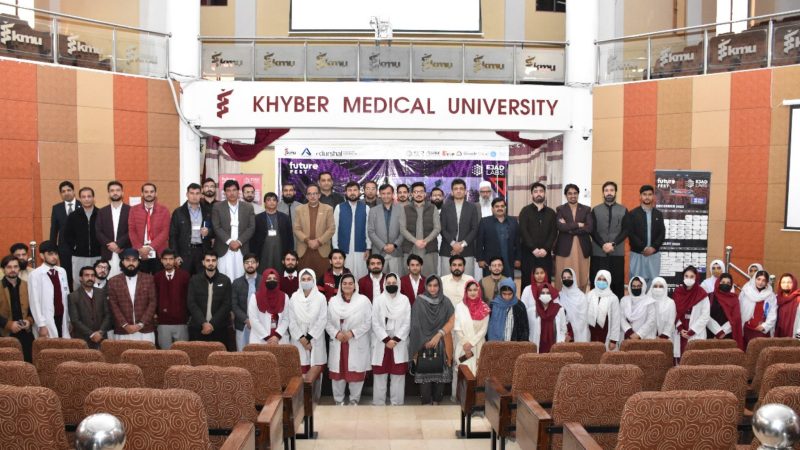
KMU is a premier institution for medical in Khyber Pakhtunkhwa. Established in 2007, KMU focuses on research, academic excellence, and practical medical training. It oversees multiple affiliated medical and dental colleges across the province, making it one of the key education hubs in Pakistan.
KMU is known for its extensive programs in medicine, public health, and allied health sciences. The university emphasizes research and has established several research centers that focus on regional health challenges. KMU’s affiliation with numerous hospitals in Peshawar provides students with a broad clinical experience, where they can interact with patients and learn about healthcare practices.
| Feature | Details |
| Location | Peshawar |
| Established | 2007 |
| Programs Offered | MBBS, Nursing, Public Health, Allied Health Sciences |
| Affiliations | Multiple hospitals and colleges in KP |
| Unique Feature | Extensive research centers and clinical exposure |
KMU’s commitment to improving healthcare in the region through quality education and research makes it a popular choice for students from Khyber Pakhtunkhwa and beyond.
7. Punjab Medical College (PMC) – Faisalabad
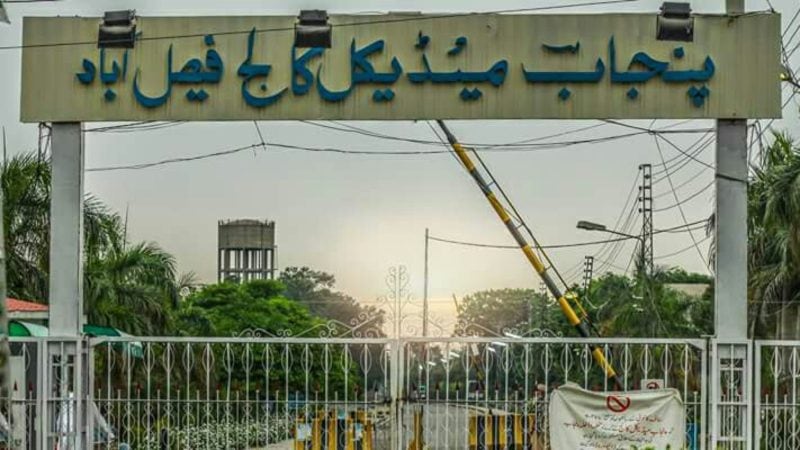
Punjab Medical College (PMC) in Faisalabad, established in 1973, is well-regarded for its excellent faculty, practical training, and focus on community healthcare. PMC is affiliated with two major hospitals: Allied Hospital and District Headquarters (DHQ) Hospital Faisalabad. These hospitals allow students to practice their skills in a busy clinical environment, helping them gain real-world experience.
PMC offers programs in MBBS, nursing, and dentistry, providing a well-rounded curriculum with a strong emphasis on primary healthcare. The college has a modern campus with well-equipped labs, a library, and sports facilities. PMC is particularly known for its community medicine program, where students get involved in healthcare initiatives to improve the health and well-being of the surrounding areas.
| Feature | Details |
| Location | Faisalabad |
| Established | 1973 |
| Programs Offered | MBBS, Nursing, Dentistry |
| Affiliations | Allied Hospital, DHQ Hospital Faisalabad |
| Unique Feature | Strong focus on community medicine |
With its solid reputation and strong emphasis on community health, PMC is ideal for students who want to make a positive impact in healthcare.
8. Liaquat University of Medical and Health Sciences (LUMHS) – Jamshoro
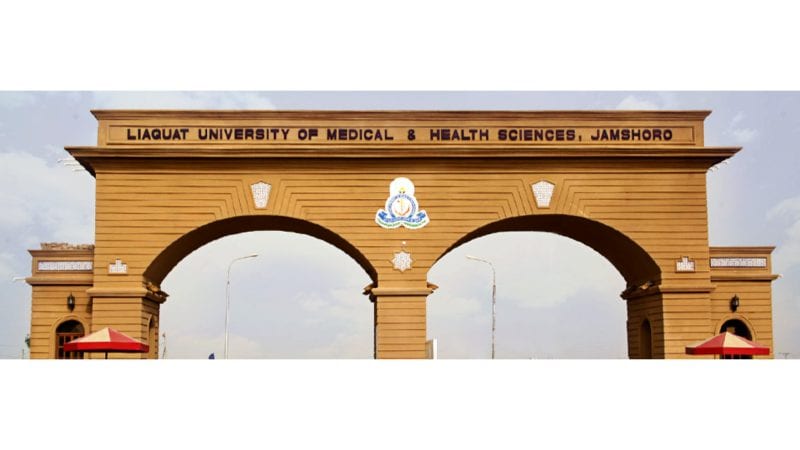
LUMHS is located in Jamshoro, Sindh. Established in 1951, it is one of the oldest and most respected medical institutions in the province. LUMHS offers programs in medicine, dentistry, pharmacy, and other health sciences, making it a versatile choice for medical students.
The university has state-of-the-art labs, a digital library, and well-equipped classrooms. LUMHS is associated with Liaquat University Hospital, where students can observe and participate in clinical activities. The university also has a rural health program where students are trained to address health issues in rural areas, which is especially relevant given the healthcare needs of Sindh’s rural population.
| Feature | Details |
| Location | Jamshoro |
| Established | 1951 |
| Programs Offered | MBBS, Dentistry, Pharmacy, Allied Health Sciences |
| Affiliation | Liaquat University Hospital |
| Unique Feature | Rural health training and community programs |
LUMHS is a great choice for students interested in both modern healthcare facilities and community healthcare in rural areas.
9. Bolan Medical College (BMC) – Quetta
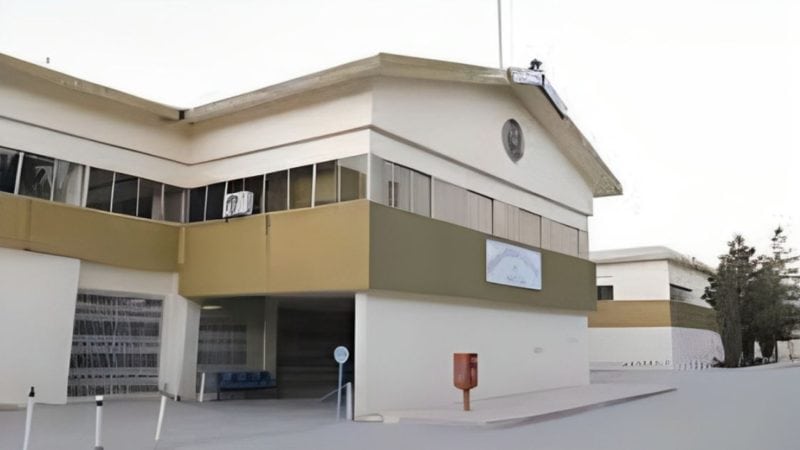
Bolan Medical College (BMC), established in 1972, is the only public medical college in Balochistan, making it a crucial institution for the region’s healthcare education. Located in Quetta, BMC trains students in MBBS and BDS, and it is affiliated with several public hospitals where students can gain practical experience.
The college has a library, research facilities, and laboratories to support student learning. Being the sole medical college in Balochistan, BMC is highly respected for its contribution to healthcare in the province. Graduates of BMC often play an important role in providing medical services to remote and underserved areas of Balochistan, contributing to the region’s healthcare improvement.
| Feature | Details |
| Location | Quetta |
| Established | 1972 |
| Programs Offered | MBBS, BDS |
| Affiliations | Sandeman Provincial Hospital, Civil Hospital Quetta |
| Unique Feature | Only public medical college in Balochistan |
BMC is a unique option for students from Balochistan who want to serve their community, as it provides essential medical training in a province with limited healthcare resources.
10. Rawalpindi Medical University (RMU) – Rawalpindi
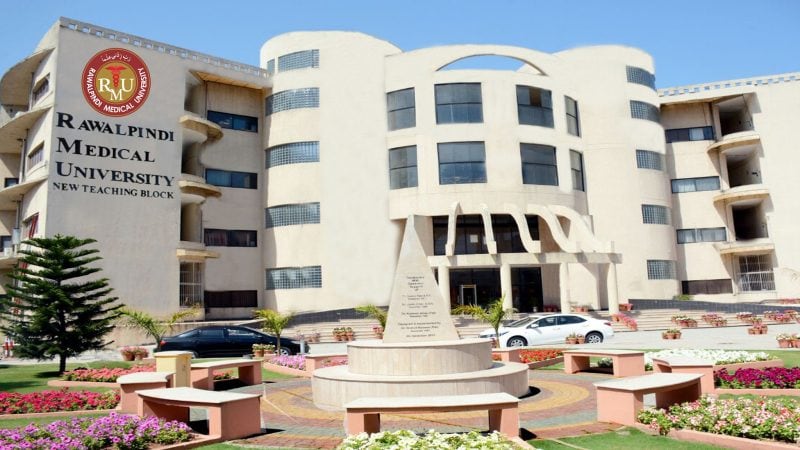
RMU was established in 1974. It is a prominent institution in Punjab that offers quality education with a focus on practical learning. The university is affiliated with three major hospitals: Holy Family Hospital, Benazir Bhutto Hospital, and District Headquarters Hospital, which provide students with hands-on training in a busy clinical environment.
RMU offers undergraduate and postgraduate programs in medicine and surgery. The university’s clinical affiliations with three hospitals allow students to gain exposure to a wide range of medical conditions and procedures. RMU also has a strong focus on medical research, encouraging students to participate in research projects that address local health challenges.
| Feature | Details |
| Location | Rawalpindi |
| Established | 1974 |
| Programs Offered | MBBS, Nursing, Postgraduate Studies |
| Affiliations | Holy Family Hospital, Benazir Bhutto Hospital, DHQ Hospital |
| Unique Feature | Broad clinical exposure with three major hospital affiliations |
RMU is an excellent choice for students looking for a hands-on medical training and education with strong clinical training in a bustling city environment.
Honorable Mentions
For students interested in other reputable medical colleges, here are some honorable mentions categorized by province. Each of these institutions provides quality education and valuable clinical experience, playing a vital role in Pakistan’s healthcare landscape.
Punjab
- Services Institute of Medical Sciences (SIMS) – Lahore
A well-known government medical college in Lahore, SIMS has a strong focus on patient care and clinical experience with affiliations to Services Hospital. - Nishtar Medical University – Multan
Known for producing skilled medical professionals in southern Punjab, Nishtar Medical University is affiliated with the highly active Nishtar Hospital, which offers ample clinical exposure. - Quaid-e-Azam Medical College (QAMC) – Bahawalpur
Serving the healthcare needs of Bahawalpur, QAMC offers programs in medicine and surgery with access to Bahawal Victoria Hospital for practical training.
Sindh
- Jinnah Sindh Medical University (JSMU) – Karachi
Located in the heart of Karachi, JSMU is recognized for its academic rigor and is affiliated with Jinnah Postgraduate Medical Centre, offering students diverse clinical cases. - Peoples University of Medical and Health-Sciences for Women (PUMHSW) – Shaheed Benazirabad
This institution is dedicated to women’s medical education and provides healthcare programs with a focus on community health. - Chandka Medical College – Larkana
An important institution for medical education in rural Sindh, Chandka Medical College provides clinical training at Chandka Medical College Hospital.
Khyber Pakhtunkhwa (KP)
- Ayub Medical College – Abbottabad
Located in the scenic city of Abbottabad, Ayub Medical College is affiliated with Ayub Teaching Hospital, where students gain hands-on experience in various medical specialties. - Gomal Medical College – Dera Ismail Khan
Serving the medical education needs of southern KP, Gomal Medical College is affiliated with Mufti Mehmood Memorial Teaching Hospital for clinical practice.
Balochistan
- Makran Medical College – Turbat
Located in Turbat, Makran Medical College focuses on training healthcare professionals to serve the rural and underserved areas of Balochistan. - Jhalawan Medical College – Khuzdar
Jhalawan Medical College offers medical education to students in central Balochistan, with a focus on addressing the province’s healthcare challenges.
Frequently Asked Questions (FAQs)
What are the benefits of studying in Lahore medical institutions?
Studying in Lahore offers students access to a variety of educational resources, clinical exposure, and well-equipped hospitals for practical training. Lahore is home to renowned institutions in Pakistan, where students can experience quality medical training and education in a vibrant cultural and academic environment in the medical field.
How do I choose between public and private medical colleges in Pakistan?
Choosing between public and private medical colleges depends on several factors, including tuition fees, faculty, facilities, and affiliations with hospitals. Public colleges are generally more affordable, while private institutions often offer advanced facilities and smaller class sizes. Researching specific colleges can help determine which aligns best with your goals.
Is there financial aid available for medical students in Pakistan?
Yes, many universities and colleges offer scholarships, need-based financial aid, and loans for students. Certain private medical colleges also provide merit-based scholarships. It’s recommended to inquire directly with the admissions office of the institution in Pakistan where you’re applying to learn about specific financial assistance programs.
What is the admission process for medical universities in Pakistan?
The admission process typically includes passing an entry test like the MDCAT (Medical and Dental College Admission Test) and meeting minimum academic requirements. Each institution may have its own criteria and deadlines, so it’s important to check directly with the admissions office of each college or university.
Can international students apply to Pakistan medical universities?
Yes, many medical colleges and universities in Pakistan welcome international students, though they may have specific application requirements. Foreign students often need to provide equivalency certificates, English proficiency test scores, and other necessary documents.
How long does it take to complete medical studies in Pakistan?
The standard medical program usually takes five years to complete. This includes pre-clinical and clinical training, followed by a mandatory house job (internship) year in an approved hospital, which provides hands-on experience.
What is unique about private medical universities in Pakistan?
Private colleges generally offer smaller class sizes, advanced facilities, and opportunities for specialized training. However, these institutions often have higher tuition fees compared to public colleges. They’re an excellent option for students who prefer modern facilities and individualized support.
How competitive is it to gain admission to a top medical university in Lahore?
Admission to Lahore’s medical colleges is highly competitive, particularly in well-known institutions due to limited seats and high demand. Students typically need to achieve excellent academic results and a high score on the MDCAT to secure a spot in these colleges.
Do the best medical universities in Pakistan offer postgraduate programs?
Not all, but many established universities offer postgraduate degrees in various specializations such as surgery, pediatrics, and internal medicine. It’s best to verify with each university’s program list to confirm available options in your area of interest.
What are the career prospects after graduating from a medical college in Pakistan?
Graduates can pursue careers in hospitals, research, or private practice. Some choose to specialize further by taking exams such as FCPS, MRCP, or USMLE to work internationally. The training provided by Pakistan’s medical colleges equips graduates with skills applicable in diverse healthcare settings.

